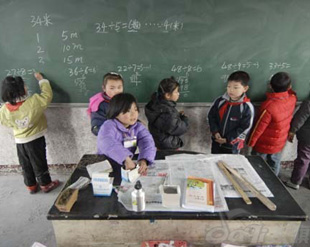| Home / Education / Photos | Tools: Save | Print | E-mail | Most Read |
| Schooling Vital for Migrant Children |
| Adjust font size: |
Tao Xiping, vice-president of the Chinese Society of Education, said at an educational forum, that opened on Wednesday in In 2004 and 2005, hundreds of factories in Subsequently, a number of cities and employers realized that by providing fair working conditions for migrant workers and education for their children they could plug the gaps in their workforces. "Migrant workers are the major force in building cities. They should be treated equally as citizens in their own right, as too should their children," Tao said. "We have seen a lot of progress over recent years in helping migrant children get access to a proper education, but more is yet to be done." According to local authority figures, migrant children account for a quarter of all Yin Houqin, deputy director of the "The rest go to private schools or ones specifically set up for migrant children where the government pays their fees. "However, we have closed many migrant children's schools because they were barely able to ensure the kids' safety, let alone provide a proper education," he said. "The government is currently spending about 10 million yuan a year to help improve the remaining migrant children's schools and merge them with the city's education system for easy management and supervision." Yin said it was difficult to know exactly how many migrant children aged under 14 were not in school, however, because of the peripatetic nature of their families. According to the Xinhua News Agency, in 2006, 9.3 percent of the country's school-age migrant children were not in school. "The central government must provide a link between the cities workers are migrating to and from, so that the whereabouts of children can be recorded and their education monitored appropriately," Tao said. "There are still too many children from poor city-based families who do not go to school at all. "And there are brand new schools in rural areas that do not have enough students," he said. "We have seen a determination from the central government to improve education for migrant children, but there are still no detailed guidelines to make it happen." ( |
| Tools: Save | Print | E-mail | Most Read |
 |
| Related Stories |
